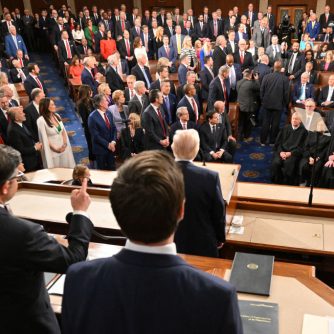On this episode of Carolina Newsmakers, host Don Curtis sits down with Eric Davis, chair of the North Carolina State Board of Education, to explore critical issues in the state’s public education system. From governance to teacher pay and the aftermath of COVID-19, Davis addresses the opportunities and challenges North Carolina schools face as they strive to provide high-quality education to nearly 1.5 million students.
The Governance of Public Education in North Carolina
Davis explains the complex governance structure of North Carolina’s public schools, which is rooted in the state’s 1868 constitution. The State Board of Education is responsible for setting policy and overseeing K-12 public schools. An elected state superintendent, alongside local school boards and superintendents, works to implement these policies. Davis emphasizes that while many hands are involved in the process, collaboration is key to ensuring the best outcomes for students.
A Legacy of Commitment to Public Education
North Carolina has a long-standing commitment to public education, which has helped transform it into an economic engine of the Southeast. Davis underscores that the state’s investments in education during the Great Depression and through the late 20th century have reaped benefits in terms of economic growth. However, he warns that recent political divisions have hampered collaboration between the State Board of Education, the superintendent, and the legislature.
Davis remains hopeful that North Carolina can return to a collaborative model, ensuring that the focus remains on students’ needs rather than political agendas. He highlights that the board members he works with, appointed by both Republican and Democratic governors, are united in their commitment to serving students rather than political interests.
The Importance of Supporting Teachers
A key theme throughout the conversation is the critical need to support North Carolina’s teachers. Davis is particularly passionate about raising teacher salaries to remain competitive with neighboring states. He points out that North Carolina used to attract teachers from across the country, but now faces the opposite problem—teachers are leaving due to low pay and a lack of respect for the profession.
Davis stresses that the state must invest more in teachers, including offering competitive salaries, better resources, and more support staff. He also touches on the harmful rhetoric around “indoctrination” accusations, which he says unfairly undermines teachers and weakens the public education system. To improve morale, Davis advocates for showing appreciation and respect for teachers and administrators, both publicly and through policy changes.
The COVID-19 Pandemic and Lessons Learned
The COVID-19 pandemic had a significant impact on education, disrupting in-person learning and widening achievement gaps. Davis praises the dedication of teachers, parents, and students in working to close those gaps, but he acknowledges there is still much work to be done to return to pre-pandemic achievement levels.
One of the key lessons from the pandemic, according to Davis, is the importance of reliable internet access. He likens internet connectivity to essential utilities like water and electricity, calling for more investment to ensure every home in North Carolina has access. The pandemic also highlighted the limitations of remote learning, with Davis concluding that nothing can replace the in-person interaction between teachers and students. While online learning can supplement traditional instruction, it cannot substitute for the relationships and support students receive in classrooms.
Addressing Testing and Accountability
Standardized testing remains a controversial issue in education, and Davis shares his perspective on how North Carolina’s approach could improve. He criticizes the current system, which relies on end-of-year “autopsy” style testing that provides little real-time feedback to students or teachers. Instead, he advocates for ongoing assessments throughout the year, allowing teachers to adjust their instruction based on students’ needs.
Davis also supports reducing the emphasis on standardized tests in evaluating both students and teachers. He argues that academic growth—a measure of how much a student improves over the course of a year—is a better indicator of teacher effectiveness than proficiency scores. Additionally, he calls for more holistic ways of measuring school performance, including factors like school climate and the overall well-being of students.
School Safety and Mental Health
In light of national incidents of school violence, school safety is a major concern for North Carolina educators and parents. Davis acknowledges the difficulty of keeping schools safe in a society where firearms are easily accessible. He emphasizes that the safety of schools is closely tied to the safety of the communities in which they are located. Strengthening communities through economic stability, employment opportunities, and public safety initiatives is key to creating safer schools.
Davis is also a strong advocate for increasing the number of mental health professionals in schools. He calls for more school psychologists, nurses, and social workers to support students’ mental and emotional well-being, freeing teachers to focus on academics. He notes that many schools already benefit from partnerships with local hospitals, which offer health clinics that provide students with access to healthcare without leaving school grounds.
The Role of Principals and Leadership
The conversation also turns to the role of school principals, whom Davis describes as essential leaders within the education system. Principals are responsible not only for managing schools but also for fostering positive relationships with teachers, students, and the community. Davis praises the leadership of North Carolina’s principals, many of whom run schools that function like small businesses, managing everything from academics to extracurricular activities.
Davis calls for greater support for principals, including continued professional development and better compensation. He believes that strong leadership at the school level is crucial for creating environments where both teachers and students can thrive.
Looking Ahead
As Davis looks to the future, his priority is ensuring that the state recommits to supporting public education at all levels. He believes that through collaboration, increased funding, and respect for educators, North Carolina can continue to provide a high-quality education system that benefits all students.





